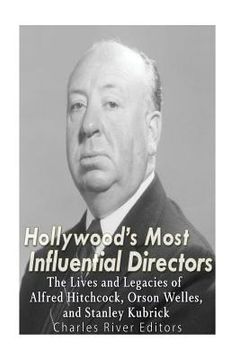Hollywood's Most Influential Directors: The Lives and Legacies of Alfred Hitchcock, Orson Welles, and Stanley Kubrick (en Inglés)
Reseña del libro "Hollywood's Most Influential Directors: The Lives and Legacies of Alfred Hitchcock, Orson Welles, and Stanley Kubrick (en Inglés)"
*Includes pictures *Includes the directors' quotes about their careers *Includes online resources and a bibliography for further reading In the opening pages of his seminal book-length study of Alfred Hitchcock, Hitchcock's Films (1965), Robin Wood famously asked, "Why Should We Take Hitchcock Seriously?" Wood then proceeded to offer a detailed examination of Hitchcock's career to that point, arguing that the Master of Suspense belonged among the ranks of the preeminent directors in Hollywood, and that his films were among the most important in American culture. When Wood was asking that question, he wasn't asking it rhetorically and was arguing for Hitchcock's relevance, which seems strange today because Hitchcock is now a Hollywood icon. No one would even think of asking that same question today, as just about every American is familiar with Hitchcock's work in some way or another. Hitchcock is regarded as perhaps the most famous and influential director in history, so Wood's question back in 1965 at least demonstrates the evolution of Hitchcock's reputation and the critical reception of his career. Indeed, as revered as Hitchcock is today, it is telling that he was never awarded an Academy Award during his career (though he was given an honorary Oscar after his retirement.) Vertigo (1958), for example, is now considered one of the landmark films of the classical Hollywood cinema, but it was both a box office and a critical flop upon its release. Other Hitchcock films, such as Psycho (1960) and North by Northwest (1959), performed well at the box office but were not viewed as high art. Indeed, it was not until the rise of Film Studies as an academic discipline - a development that saw Hitchcock's films get co-opted by scholars of the horror and suspense genres, feminist film theorists, and film historians - that Hitchcock's reputation as a significant artist and director crystallized. Thus, not only did Hitchcock's career itself undergo dramatic fluctuations, his reception has been every bit as circuitous in its trajectory. When it comes to Hollywood and the entertainment industry, perhaps nobody catapulted to fame as quickly or as strangely as Orson Welles, but it would also be safe to say that few produced such critically acclaimed work either. Though he had worked on stage productions from an early age and seamlessly transitioned into radio, few were familiar with his work until a legendary 1938 radio broadcast of H.G. Wells' The War of the Worlds, during which some people who heard Welles narrating the work truly believed that an alien invasion was underway. As Welles famously apologized at the end of the broadcast, "This is Orson Welles, ladies and gentlemen, out of character, to assure you that The War of the Worlds has no further significance than as the holiday offering it was intended to be; The Mercury Theatre's own radio version of dressing up in a sheet and jumping out of a bush and saying 'Boo!'" There may be no director in American film history who was better able to combine commercial appeal with art house style like Stanley Kubrick. As his career progressed, his films grew increasingly challenging, with slow, methodical plots that made for running times that spanned upwards of three hours, but no matter how much Kubrick may have broken away from the standard 90-minute Hollywood fare and threatened to alienate his audience, there is no denying the special place his films hold in pop culture. 2001: A Space Odyssey (1969), A Clockwork Orange (1972), and The Shining (1982) remain among the more widely-loved films of the latter half of the 20th century among both critics and casual moviegoers alike. As much as Kubrick was able to satisfy the American viewer, his virtuoso camera technique and use of sound place him on par with major international directors of the art house circuit, like Ingmar Bergman, Federico Fellini, and Michelangelo Antonioni.

